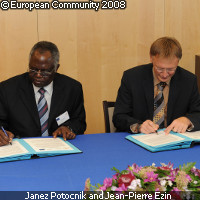EU/AU partnership in science, ITC and space presents flagship projects
Commissioners of the European Union (EU) and the African Union (AU) have released a joint statement on the need to strengthen African research capacity and presented 19 flagship projects that will form the basis of the EU/AU thematic partnership in science, information and communication technology (ICT) and space. The joint statement on 'Implementation of the EU-AU Partnership for Science, Information Society and Space' was issued by EU Commissioner for Science and Research Janez Potocnik and others together with AU Commissioner for Human Resources, Science and Technology, Professor Jean Pierre Onvehoun Ezin. The statement addressed the need to bolster African research infrastructures so that 'Africa can produce and use its own knowledge and services' and develop sound S&T (science and technology) and ICT policies. The Commissioners also presented a list of 19 projects, 6 of which are to receive immediate attention. These flagship projects were identified by the African Union Commission (AUC) as being pertinent to African needs and challenges, and were agreed upon by the European Commission (EC) as the basis for implementing the thematic partnership. The six 'early deliverable' projects include two internet-enhancing projects ('Africa connect' and 'African internet exchange system (AXIS)'); two that will help develop AU scientific resources ('Africa research grants' and 'Water and food security in Africa'); one to develop Africa's access to global monitoring ('Kopernicus-Africa'); and one on enhancing African access to the geospatial sciences ('Capacity building in the AUC on geospatial sciences'). 'Africa Connect' will link up GÉANT2, the high-bandwidth, academic internet that serves Europe's research and education community, with regional research and education networks in Sub-Saharan Africa. 'AXIS' will provide technical assistance as well as planning, regulation, policy and human training support to promote the establishment of a continental African internet infrastructure, to further the goal of keeping internet traffic local and offering better quality of service. The pan-African grants programme will support sustainable science and technology research and provide opportunities for researchers to work together across national borders. 'Water and food security in Africa' addresses food security problems and promotes sustainable land- and water-resource management. The project will analyse the negative effects of climate change in strategic and fragile river basins and define remedial strategies. Kopernicus refers to the Global Monitoring for Environment and Security (GMES) system. 'Kopernicus-Africa' addresses the role of space science in development and poverty alleviation; for example using the global monitoring system to provide up-to-date information on specific crop needs. The project will involve users, AUC policymakers, AUC Member States and regional economic communities in developing an action plan to be submitted at the third EU-Africa Summit. 'Capacity building in the AUC on Geospatial Sciences' aims to enable pan-African use of geospatial sciences, which can provide services to estimate crop yields, monitor surface water resource location and availability, map and measure deforestation and quantify land degradation trends. EC staff seconded to the AUC will work on integrating EC-developed geospatial systems into the AUC. The remaining 13 projects include an African ICT leadership initiative, an S&T popularisation project, developing a common AU S&T policy framework, S&T for the development of African SMEs and the AU initiative on climate change, among others. In the joint statement, EU and AU Member States, industry and civil society were called upon to coordinate their involvement in the flagship projects, ensuring that they receive adequate funding and can thus be implemented successfully. According to the statement, resources from the European Seventh Framework Programme (FP7) as well as from other EC development programmes will be made available 'to broaden African participation notably in the areas of health, environment and climate, energy, agriculture and food, information and communication technologies and space applications'. The EU/Africa thematic partnership in science, ICT and space was established in Lisbon in December 2007 as part of the EU/Africa Strategic Partnership.



